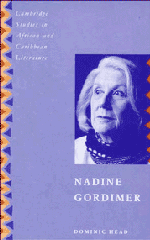Book contents
- Frontmatter
- Contents
- Preface
- List of abbreviations
- Chronology
- 1 Gordimer and South Africa: themes, issues and literary identity
- 2 The early novels: The Lying Days, A World of Strangers and Occasion for Loving
- 3 Developing narrative muscle: The Late Bourgeois World, A Guest of Honour and The Conservationist
- 4 The construction of identity: Burger's Daughter and July's People
- 5 Self-reflexive reassessments: A Sport of Nature and My Son's Story
- 6 The short stories
- 7 Conclusion. Gordimer: postmodernist?
- Notes
- Select bibliography
- Index
4 - The construction of identity: Burger's Daughter and July's People
Published online by Cambridge University Press: 05 July 2011
- Frontmatter
- Contents
- Preface
- List of abbreviations
- Chronology
- 1 Gordimer and South Africa: themes, issues and literary identity
- 2 The early novels: The Lying Days, A World of Strangers and Occasion for Loving
- 3 Developing narrative muscle: The Late Bourgeois World, A Guest of Honour and The Conservationist
- 4 The construction of identity: Burger's Daughter and July's People
- 5 Self-reflexive reassessments: A Sport of Nature and My Son's Story
- 6 The short stories
- 7 Conclusion. Gordimer: postmodernist?
- Notes
- Select bibliography
- Index
Summary
In the novel sequence up to The Conservationist Gordimer comes to articulate with increasing clarity the logic that underlies all her work: that discursive practices create and promulgate ideology and that, consequently, such practices are the sites of the contestation of power. In this sense her growing literary self-consciousness, far from signalling an intellectual withdrawal from political reality, affords an appropriate way of investigating the role of novelistic discourse in the broader network of ideological discursive practices. The overt transtextuality of The Late Bourgeois World, A Guest of Honour and The Conservationist represents one way of conducting such an investigation: these novels themselves become sites of discursive interaction in which very different discourses – promulgating political aesthetics, anti-colonial revolution and ethnic mythology – are tested and contested at length through the construction of a fiction. In Burger's Daughter (1979) and July's People (1981) Gordimer continues her investigation of discursive practices, but in a different context focusing specifically on the construction of individual identities. These novels also represent continuity with the previous group in that a revolutionary context supplies the impetus of the investigations.
BURGER'S DAUGHTER
In Burger's Daughter Gordimer takes her examination of the committed white South African to a new plane: here she considers the ethical dilemmas and choices of someone effectively born into a tradition of white political resistance; or, more precisely, of someone whose commitment has been, and continues to be, determined by a particular ideology.
- Type
- Chapter
- Information
- Nadine Gordimer , pp. 110 - 135Publisher: Cambridge University PressPrint publication year: 1994

